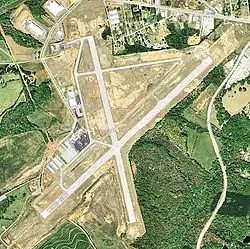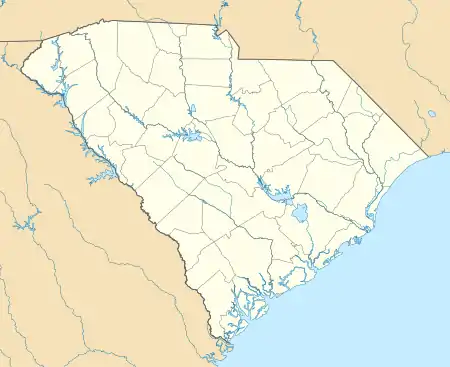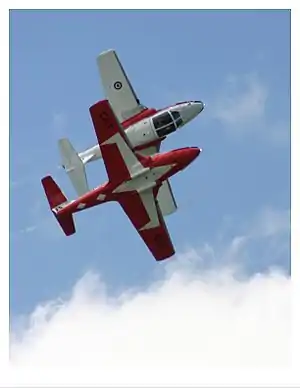Anderson Regional Airport
Anderson Regional Airport (IATA: AND, ICAO: KAND, FAA LID: AND) is a public airport 3 nautical miles (5.6 kilometres) southwest of Anderson, in Anderson County, South Carolina, United States. It is one of the busiest airports in upstate South Carolina. It receives over 14,000 visitors each year and generates over $13 million annually.[2]
Anderson Regional Airport Anderson Auxiliary Field | |||||||||||||||
|---|---|---|---|---|---|---|---|---|---|---|---|---|---|---|---|
 2006 USGS photo | |||||||||||||||
| Summary | |||||||||||||||
| Airport type | Public | ||||||||||||||
| Operator | County of Anderson | ||||||||||||||
| Serves | Anderson, South Carolina | ||||||||||||||
| Elevation AMSL | 782 ft / 238.4 m | ||||||||||||||
| Coordinates | 34°29′41″N 082°42′34″W | ||||||||||||||
| Map | |||||||||||||||
 KAND | |||||||||||||||
| Runways | |||||||||||||||
| |||||||||||||||
| Helipads | |||||||||||||||
| |||||||||||||||

Anderson has no airline service or concourses for gates, and no control tower, but in 2007 one runway was extended 1,000 ft (300 m) to handle larger aircraft.
In May 2018, airport authorities announced plans for a 6.71 million dollar facelift. The plan includes further improvements of the main runway and building a new ADA-compliant general aviation terminal. Once the new terminal was completed, the old terminal built in 1970[3] was demolished.[4]
Since 2009, the airport has hosted an annual airshow that typically runs Saturday-Sunday and is free to the public. The Anderson Regional Airshow attracts an estimated 50,000 visitors to the airport each year during the two-day event.[5]
Anderson Regional Airport covers 704 acres (2.85 km2) and has two runways and two helipads:
- 5/23: 6,002 feet (1,829 m) by 150 feet (46 m), asphalt
- 17/35: 4,996 feet (1,523 m) by 150 feet (46 m), asphalt
- H1: 50 feet (15 m) by 50 feet (15 m), concrete
- H2: 50 feet (15 m) by 50 feet (15 m), concrete
New Prospect Elementary School is across from the airport; the school mascot is the Jets. It is the headquarters of the Anderson County Civil Air Patrol.
History

Anderson County Airport, the first airport in the area, was founded in 1927. It was a grass field that was designated as an emergency landing field; eventually it was used to deliver air mail.
Famous aviator Amelia Earhart visited the airport on November 14, 1931; she was greeted by over 1,000 residents while she toured the town and met with local civic leaders. The visit was credited with creating enthusiasm for a better airport.
Within a year of her visit, civic leaders bought land 3 miles from downtown and plans were made for the new airport.[3] Though Earhart was given credit for inspiring residents to build the new airport, she and her plane disappeared over the South Pacific two months before the airport opened in September 1937.

During World War II the airport was an auxiliary airfield for the United States Army Air Forces,[3] supporting the combat flight training at Greenville Army Airbase. Control of the airport was returned to local authorities in the fall of 1945.[6] The civilian pilot training for the Army Air Force was conducted at the Anderson Airport, and students from Clemson College participated in the flight training program.[3]
In the 1950s Eastern Airlines scheduled three or four daily departures. The airport was one of Eastern's smallest stations, but famed World War I fighter ace and eventual CEO of Eastern Airlines, Eddie Rickenbacker, once made an unannounced stop. "Captain Eddie" inspected operations and visited briefly with employees; his visit that day was featured in Life magazine.[7]
Eastern stopped at the airport from 1947[6] until 1964; Southern Airways arrived in 1964 and left in 1974.[6][7] The airport has been served briefly by various commuter airlines and air taxi service, including ImagineAir.
Accidents and incidents
- On June 16, 2012 1:30 p.m. an experimental airplane crashed in some trees near the airport runway. The pilot and sole passenger were not injured.[8]
- On April 27, 2012 at 1:00 p.m. a Cirrus SR22 crashed on approach 600 yards of the runway, killing the pilot and injuring the passenger.[9]
- On December 9, 2004 at 10:20 a.m. a Diamond DA40 en route to Anderson Regional was diverted due to poor visibility. The airport's instrument landing system, which helps pilots land in low visibility, was turned off due to an extension on the main runway. The plane crashed en route to a neighboring airport, killing all three on board.[10]
See also
References
- FAA Airport Form 5010 for AND PDF, effective 5 November 2020.
- http://thejournalonline.com/2018/10/17/groundbreaking-held-for-new-anderson-regional-airport-terminal/
- https://www.independentmail.com/story/life/2016/10/21/airport-once-army-training-center/92380364/
- https://www.independentmail.com/story/news/local/2018/05/18/anderson-regional-airport-get-6-7-facelift/620579002/
- https://www.independentmail.com/story/news/local/2017/12/05/canadian-snowbirds-perform-here-may/922822001/
- http://archive.independentmail.com/business/commercial-heyday-gone-but-airport-remains-crowd-friendly-ep-1148165937-348281111.html
- https://www.sunshineskies.com/eastern-dc3-1949.html
- http://archive.independentmail.com/news/local/authorities-respond-to-plane-crash-at-anderson-regional-airport-ep-408077151-348420761.html/
- http://archive.independentmail.com/news/local/one-dead-in-fiery-crash-at-anderson-airport-ep-408267921-348501581.html/
- https://www.goupstate.com/news/20041210/small-plane-crashes-near-anderson
External links
| Wikimedia Commons has media related to Anderson Regional Airport. |
- Resources for this airport:
- FAA airport information for AND
- AirNav airport information for KAND
- ASN accident history for AND
- FlightAware airport information and live flight tracker
- NOAA/NWS weather observations: current, past three days
- SkyVector aeronautical chart, Terminal Procedures
.jpg.webp)
.svg.png.webp)